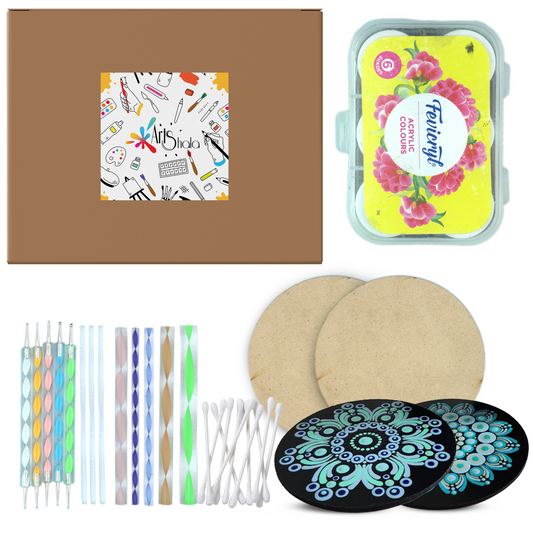Is Epoxy Resin Safe? Understanding Hazards & Safety Measures
Epoxy resin has become extremely popular in various industries, such as arts and crafts, woodworking, and construction. Its ability to create a shiny and long-lasting finish makes it a top choice for many projects. However, before you start using epoxy resin, it's important to understand how to use it safely.
Safety should always be your top priority when working with epoxy resin because it can pose serious health risks if not handled or used correctly. By knowing what it's made of and understanding the potential dangers involved, you can take the necessary steps to protect yourself. Attending a resin art workshop is a great way to gain hands-on experience working with epoxy resin in a safe environment.
In this blog, we will focus on the safety aspects of epoxy resin and provide you with all the essential information you need to know about the safety of epoxy resin. So, let's jump in and learn about the potential hazards of epoxy resin!
Understanding Epoxy Resin Composition and Potential Hazards
Epoxy resin is a versatile chemical product that is commonly used in various industries, including construction and art. It is known for its highly effective adhesion, durability, and resistance to heat and chemicals. However, it is important to understand the potential hazards associated with epoxy resin to ensure safe handling and use.
Potential Health Hazards
While epoxy resin offers many benefits, it also poses potential health hazards if not handled properly. One of the main concerns is volatile organic compound (VOC) emissions from conventional epoxy formulations. VOCs are released during the curing process and can cause respiratory irritation, headaches, dizziness, and nausea when inhaled in high concentrations.
In addition to VOC emissions, direct skin contact with uncured epoxy resin can lead to skin irritation or sensitisation. It is very important to wear protective gloves and clothing when working with uncured epoxy to minimise the risk of skin exposure.
Bio-based Epoxy Resins for Safety and Sustainability
Bio-based epoxy resins have emerged as a safer and more sustainable alternative to conventional epoxy resins to address safety concerns related to conventional epoxy resins. These resins are derived from renewable resources such as plants or vegetable oils, reducing the reliance on fossil fuels and minimising the environmental impact. Bio-based epoxy resins offer several benefits in terms of safety and sustainability:
- Reduced VOC Emissions: Bio-based resins typically have lower VOC emissions compared to conventional epoxy formulations, making them safer to use in enclosed spaces.
- Biodegradability: Unlike traditional epoxy resins, bio-based resins are biodegradable, reducing their impact on the environment.
- Renewable Resources: Using renewable resources, bio-based epoxy resins leads to a more sustainable and eco-friendly manufacturing process.
The Importance of Epoxy Resin Safety Precautions
Epoxy resin is a versatile material being used in various applications, including arts and crafts, woodworking, and industrial settings. While it offers exceptional durability and aesthetic appeal, it's crucial to prioritise safety precautions when working with epoxy resin to protect yourself and others. Here, we will explore the importance of safety measures during application and curing.
1. Minimising Risks during Application and Curing
When working with epoxy resin, it's essential to be aware of the possible risks that can arise and take necessary precautions to minimise them. Here are some key points to consider:
- Effects of skin contact with uncured epoxy resin: Uncured epoxy resin can cause skin irritation or allergic reactions in some individuals. Always wear gloves when handling the resin to protect your skin and avoid prolonged or repeated contact.
- Potential dangers and precautions related to ingesting resinous materials: Accidental ingestion of epoxy resin can have adverse health effects. It's crucial to prevent any contact between resinous materials and your mouth or food surfaces. Be extra aware of hygiene practices, such as washing hands thoroughly after working with epoxy resin.
- Ensuring adequate ventilation: During the curing process, epoxy resin releases volatile organic compounds (VOCs) that can be harmful if inhaled in high concentrations. To maintain a safe environment, ensure excellent airflow by opening windows and doors or adding exhaust fans to remove fumes from the workspace. Consider using respiratory protection such as masks rated for organic vapours if working in an enclosed area.
By following these safety measures, you can decrease the risks associated with handling epoxy resin. In addition to personal safety, it's also crucial to consider the safety of others who may come into contact with epoxy resin products. Properly storing and disposing of epoxy resin materials can help prevent accidents and minimise environmental impact.
2. Safe Ventilation and Storage Practices for Epoxy Resin Products
These safety measures can create a safer environment for working with epoxy resin while increasing your resin products' shelf life. Here are some key points to consider:
Importance of Proper Air Circulation
Adequate ventilation in the workspace is essential to reduce the concentration of fumes emitted during the resin application and curing process. This helps mitigate the risk of inhaling volatile organic compounds (VOCs) present in conventional epoxy formulations.
Recommended Storage Conditions
Proper storage is crucial for ensuring the good quality and integrity of epoxy resin products. It is advisable to store resin materials in a cool, dry place far away from strong sunlight and sources of heat. Additionally, ensuring that the containers are tightly closed can help prevent contamination and preserve the resin's effectiveness.
Conclusion
Epoxy resin is a durable and widely used material in various industries and art projects. While it offers many benefits, it is crucial to prioritise safety when working with epoxy resin. Users can significantly minimise the potential risks associated with epoxy resin by following proper safety precautions, such as wearing protective gear, ensuring adequate ventilation, and practising safe handling techniques.
When choosing epoxy resin products, it is essential to opt for reputable brands which prioritise safety and offer high-quality products that adhere to safety standards. By selecting such brands, you can have peace of mind knowing that you are using safe and reliable materials for your projects.
To further enhance your knowledge and skills in resin arts and crafts, Contact Us on Arts Shala. It is a platform that provides workshops and resources for individuals interested in exploring resin arts and crafts. By gaining more experience in a safe environment, you can continue to create beautiful resin artwork while ensuring your safety.











